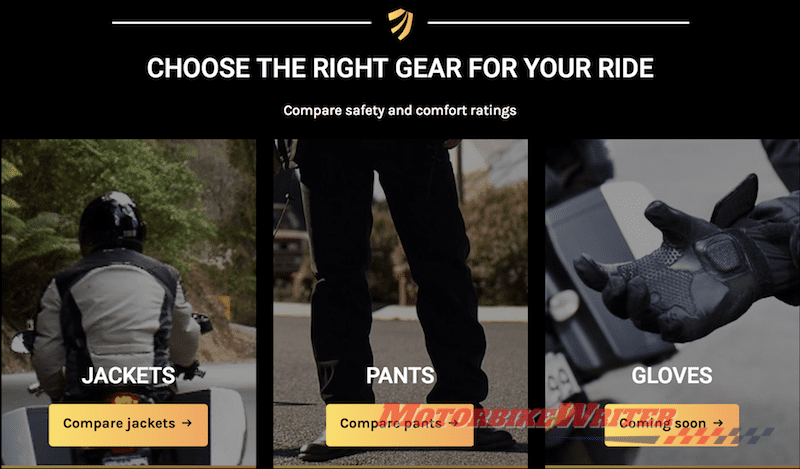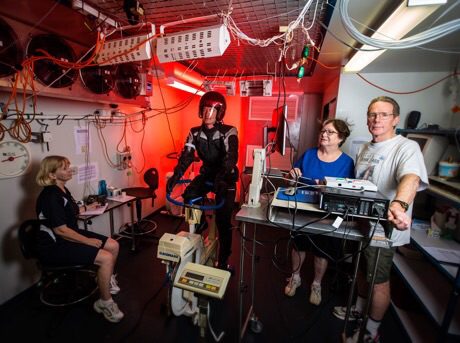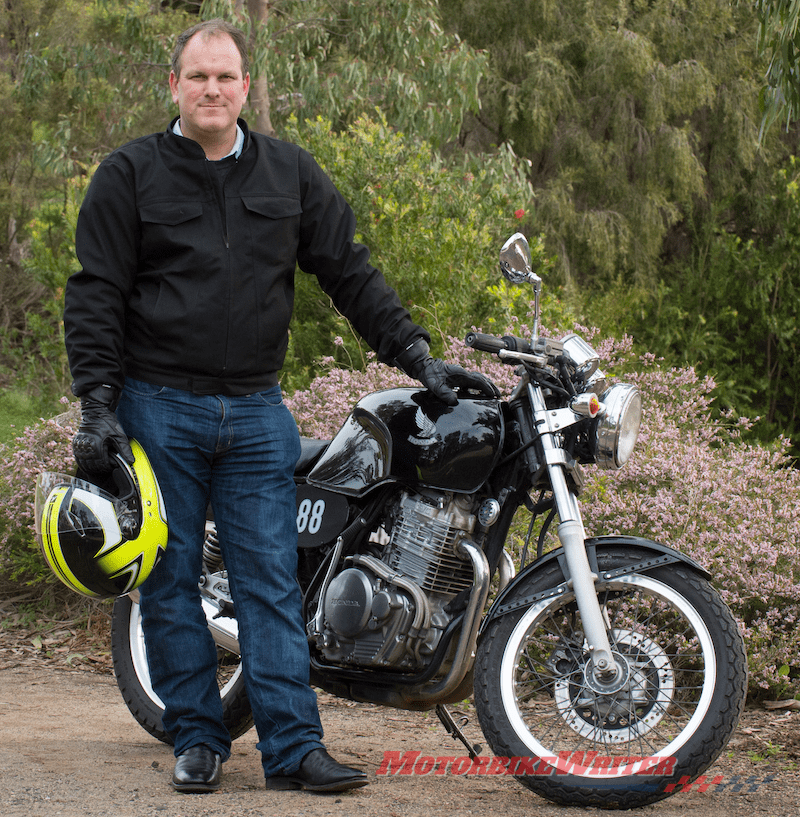Australian safety and comfort ratings system for motorcycle clothing, MotoCAP, has won a Fédération Internationale de Motocyclisme (FIM) road safety award.
MotoCAP, which was launched in September last year, is the first of its type in the world and has now rated 171 items of clothing, including 43 pairs of pants, 82 jackets and 46 pairs of gloves.
FIM award
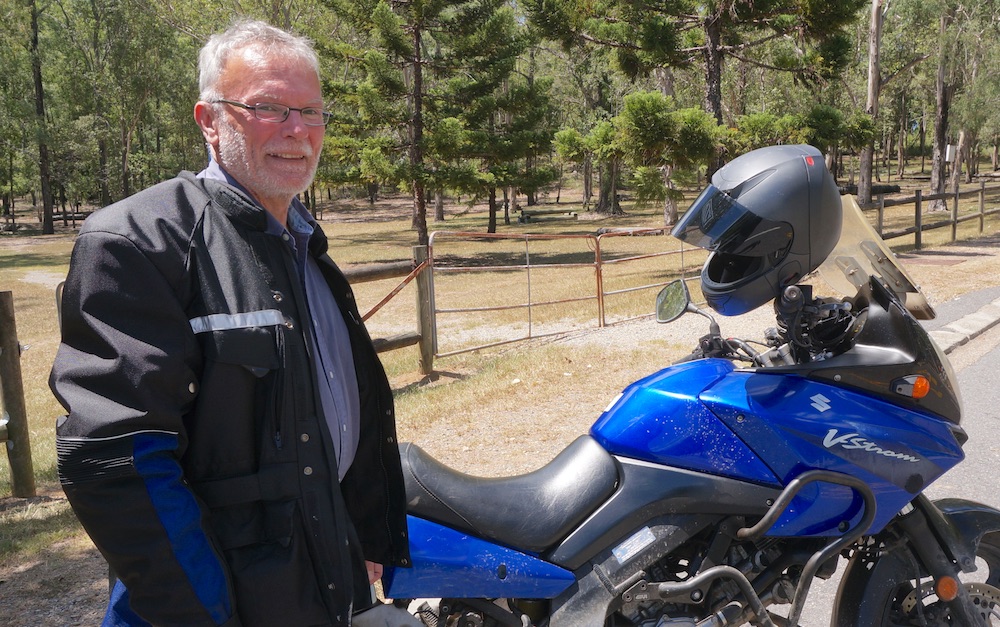
The award, presented this morning (2 December 2019) in Monaco along with 40 other recipients, has been applauded by Australian Motorcycle Council chair Guy Stanford.
“We are very pleased with the FIM award which demonstrates the value of the MotoCAP program worldwide,” he says.
“Clothing manufacturers’ advertising is not always a credible source of what is useful when a crash happens or heat fatigue arises in the Australian summer.”
MotoCAP gives clothing two separate star ratings – one for protection and one for heat management (“comfort”).
AMC Protective Clothing sub-committee chair Brian Wood also points out that MotoCAP tests the whole garment, unlike European Protective Clothing Standards which only tests samples of fabrics, fastenings and stitching.
“(It) gives the motorcycle community more information when they are making choices about the clothing they wear when riding,” he says.
MotoCAP history
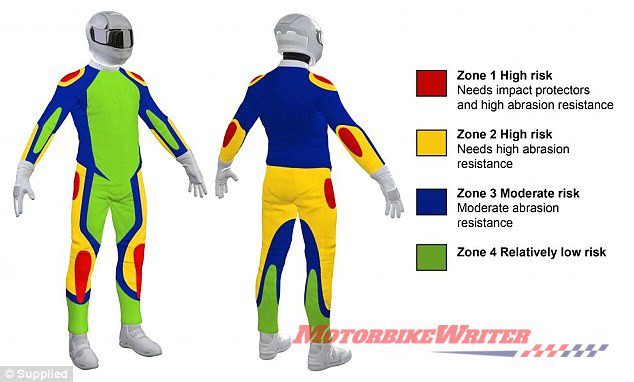
- 2003 – The Motorcycle Council of NSW (MCC) obtained a grant from the Motor Accidents Authority of NSW (MAA) to investigate the features of effective motorcycle personal protective equipment (PPE).The outcome was a report and the establishment of websites for the MCC and the Accident Compensation Commission (NZ) to provide information about protective clothing and other motorcycle safety issues to riders in Australia and New Zealand.
- 2005 – A national PPE industry seminar was held by the MCC with the support and funding of the MAA to consider the implications of the European Standards for PPE. A proposal to establish an Australian star rating scheme for PPE was canvassed and supported by the participants.
- 2006 – The roads authority of Victoria (VicRoads), commissioned a report investigating the options for a star rating scheme compared to industry standards for PPE.
- 2007 – The National Roads and Motorists Association (NRMA) funded a survey of novice riders to establish their knowledge, information sources and usage of PPE.
- 2008 – Swann Motorcycle Insurance funded a study of the injury reduction benefits of the clothing worn by injured and un-injured riders involved serious crashes. The study confirmed the potential for PPE to reduce the risk and severity of injuries, but also identified high rates of garment failure under crash conditions. The study also validated the impact risk zones framework of the European standards against clothing damage and rider injuries in real world crashes.
- 2008 – PPE researcher invited to give a presentation on protective clothing research to members at the AMC Annual Conference.
- 2009 – AMC successfully lobbied Federal Government for funding to publish and distribute a guide to riders on the features of effective motorcycle protective clothing ‘The Good Gear Guide’.
- 2010 – 2012 – The State of Victoria, Parliamentary Road Safety Committee convened a series of meetings to “inquire into, consider and report… on motorcycle safety.” The formation of a star rating scheme for motorcyclists’ apparel was supported by Recommendations 51 – 53. (Parliamentary Road safety Committee 2012)
- 2011–- The Australian and New Zealand Government Injury Insurance agencies commissioned industry consultations and research into the development of a model for providing riders with reliable information when buying motorcycle protective gear.
- 2011 – The Victorian Transport Accident Commission (TAC) organised a series of state-wide seminars – entitled “What’s Safe?” – which covered the testing and other assessments of motorcyclists’ clothing, of which riders, retailers and clothing suppliers were amongst the interested parties who attended.
- 2012 – The TAC conducted feasibility studies including community and industry consultations to establish support for a PPE ratings program.
- 2014 – the NRMA ACT Road Safety Trust funded an investigation of the impact of thermally inefficient PPE worn in hot conditions on rider fatigue, reaction times and mood.
Motorcycle gear tested in a thermal chamber with (from left) research assistant Liz Taylor, volunteer rider Dr Greg Peoples, Liz de Rome and Nigel Taylor. - 2014 – The AMC formed a Protective Clothing Sub-Committee which developed a Position Statement on Protective Clothing from a rider’s perspective.
- 2014 2015, 2016 – AMC Annual Conferences invited PPE researchers to provide updates on research progress on protective clothing.
- 2015 – The AMC collated and listed CE approved gear available in Australia on its website to assist riders in choosing suitable gear. The AMC joined the Australian and New Zealand Working Group tasked to develop a 5 Star Rating scheme.
- 2015 – The Motorcycle Protective Clothing working group formed, consisting of 10 members from government agencies and motoring clubs, led by the TAC.
- 2015 – NSW Parliamentary Stay Safe Committee Inquiry into motorcycle safety recommended that a star rating scheme for motorcyclists protective clothing be developed (Staysafe Committee 2015).
- 2015 – The NSW Minister for Roads, announced the establishment of a national project to develop a consumer rating program for motorcycle protective clothing and to encourage manufacturers to provide a range of more effective protective clothing suitable for Australian conditions (NSW Government 2015).
- 2016 – The science program ‘Catalyst’ produced a segment on motorcycle protective clothing, this was broadcast by the national broadcaster, the Australian Broadcasting Commission (ABC)
- 2016 – The Transport for NSW, Centre for Road Safety (CRS) assumed the lead role for the Motorcycle Protective Clothing working group and commissioned the development of test protocols for a PPE star rating scheme in consultation with industry (de Rome et al 2016). The CRS actively sought interested parties, and the consortium grew to 20 members.
- 2016 – Dr Liz de Rome and Dr Chris Hurren from Deakin University Institute for Frontier Materials were contracted to the consortium to develop test and rating protocols for motorcycle protective clothing.
Chris Hurren and his Honda GB400 - 2016 – The test protocols were distributed for comment to the motorcycle accessories industry in Australia and New Zealand including local manufacturers and importers.
- 2017 – Liz and C hris were contracted to trial the test protocols fr a 12-month period, allowing time for industry to respond. Product test results were released on a confidential basis to the relevant local manufacturer or importer.
- 2018 – The doctors were contracted to the consortium to conduct testing of motorcycle protective clothing for publication under the MotoCAP program.
- 2018 – The Motorcycle Clothing Assessment Program, or MotoCAP, and the accompanying website, www.motocap.com.au, were launched in September by the MotoCAP working group, with products tested at the Deakin University Institute for Frontier Materials. At launch, there were 20 products rated on the website. At the time of this submission, there were 128 products on the website, with the site frequently updated.
Under MotoCAP, the National Association of Testing Authorities-accredited laboratory at Deakin University, led by Dr Chris Hurren, tests and rates the protective performance and thermal management of a random sample of the motorcycle jackets, pants and gloves available in Australia and New Zealand.
The CRS publishes the results on the MotoCAP website on behalf of the consortium. The ratings use the same test methods as current European standards, and rather than using a simple pass/fail score, they allow products to be ranked and rated on their relative performance, allowing riders to choose the most appropriate gear for their riding conditions.
The draft test protocols have been distributed widely across the Australian and New Zealand industry, including to importers and manufacturers, to enable industry to test their own products against the MotoCAP requirements.
- MotoCAP is a partnership between Transport for NSW, State Insurance Regulatory Authority (SIRA), VicRoads, Transport Accident Commission (TAC), Royal Automobile Club of Victoria (RACV), Department of Transport and Main Roads (TMR), Motor Accident Insurance Commission (MAIC), Lifetime Support Authority (LSA), Western Australian Police: Road Safety Commission, Department of State Growth, Insurance Australia Group (IAG), Australian Motorcycle Council and Accident Compensation Corporation in New Zealand.


